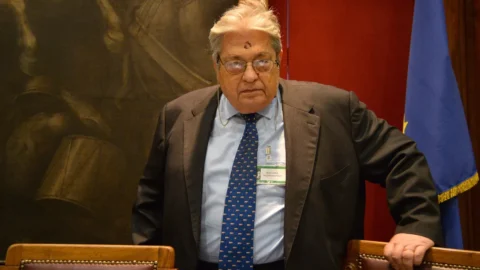Even economists have a secret dream. Mario Noera, professor of Finance and economics of markets and financial intermediaries at Bocconi, hopes that one day Angela Merkel, who knows the power of words well, will surprise the financial world with a strong exit, like the whatever it takes with which Mario Draghi stopped the collapse of the euro. “It's a paradox – Professor Noera holds back – but less imaginative than it appears”.
Why?
“Angela Merkel, like Wolfgang Schaueble, is a convinced pro-European and federalist. The last thing you want is the collapse of the euro. I really don't think Germany is moving in this direction. But the Germans insist on making a mistake, considering a balanced budget as a precondition for the construction of Europe. A little liberal orthodoxy, a lot for the success that this policy has had in the take-off of post-war Germany. It is not easy for them to give up this strategy”.
Nor do they intend to, as far as we can see…
"Likely. But don't forget that Merkel, in this interpreter of the will of the electorate, is also a political leader with a strong pragmatic spirit. Berlin is perfectly aware that the economic model of recent years, based on exports to emerging countries, cannot be replicated in the near future. Even regardless of the Ukrainian crisis”.
Therefore?
“Right now there are two wars going on in Europe. The first concerns the Juncker plan, a weak and timid attempt to introduce fiscal policy innovations on the Continent. It is completely insufficient, based as it is on 8 billion euros which should activate private investments of up to 315 billion, with an unrealistic and in any case dangerous leverage effect: a drop in the bucket, it will only make sense if other funds and other ideas flow in”. .
And the second battle?
“It is the correct one, which Mario Draghi is leading. Let's hope that he will not be diverted to the Quirinale, because it is too important for him to stay in Frankfurt ”.
On the first front, Italy has moved its pawns. Or not?
“Beyond the chatter, a policy of small steps in tow political, indeed cultural, was followed in an absolutely unsatisfactory framework. It was France that posed a political problem in the face of numbers opposed by Brussels. You did it from a nationalistic angle, but you did. Unfortunately we have not been able to pose the most relevant political problem”.
Or?
“To do what the United States did 5-6 years late, either in terms of monetary policy, where Draghi has yet to break down the resistance of the Bundesbank, or in terms of investment policy: five years ago Washington implemented a 900 billion bazooka, today it is reaping the fruits”.
According to Wolfgang Muchau of the Financial Times, the only European political groups with a coherent and logical vision are Syriza in Greece and Podemos in Spain: both support the need to cancel part of the debt and launch an apolitical investment policy.
“I think exactly like Munchau and like the chief economist Martin Wolf. Unfortunately, it is not possible to compare the merits of these ideas, even with the countries that should most reflect on the limits of the policy practiced so far".
Italy?
“Our government has had a disappointing, somewhat scholastic approach. Perhaps tactically skilled, but but more inclined to preach than to do. Yet it would be important to take the initiative and start a political reflection in good time. 2017, the year of the French elections and the English referendum, is not far off. Before that, in a few weeks, Tsipras could pose the problem in Greece. It is appropriate to raise certain issues in time, because by now the risk has reached far beyond the economic emergency”.
Fortunately, oil is solving some problems.
“Apparently. We have always been used to considering the drop in crude oil as only positive news. Now that's not the case anymore. Of course, in the short term, the positive aspects prevail for our trade balance and for businesses. But deflation, combined with the destabilizing effect of falling oil revenues in many economies, can spark an international crisis. I don't think that will be the case for Russia, which has strong reserves. But Venezuela is now one step away from default and could trigger a dangerous domino effect".
What concerns us?
"I dare not think about the effect on the spread in the event of several defaults of countries strongly committed to Wall Street or to China itself".
In short, the world remains a dangerous place. Europe, in particular, is relishing the soporific effect of low rates, as well as the cut in the oil bill. But he refuses to activate an investment policy with serious risk for everyone. There's no need to be happy.
"No, but we can trust the common sense of some politicians."
Matthew Renzi? Francois Hollande?
“I think that a real change of pace, like Draghi, can only be done by Angela Merkel. It wouldn't take much: just a political and symbolic opening to investments in the European market, which Germany itself has great need for”.





